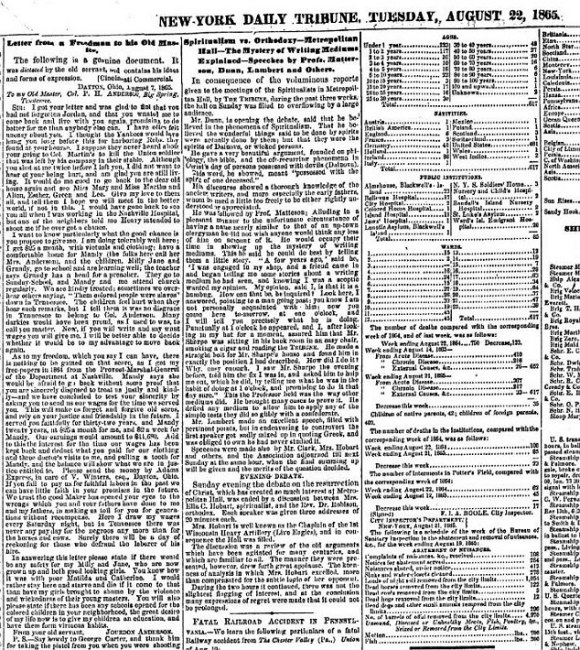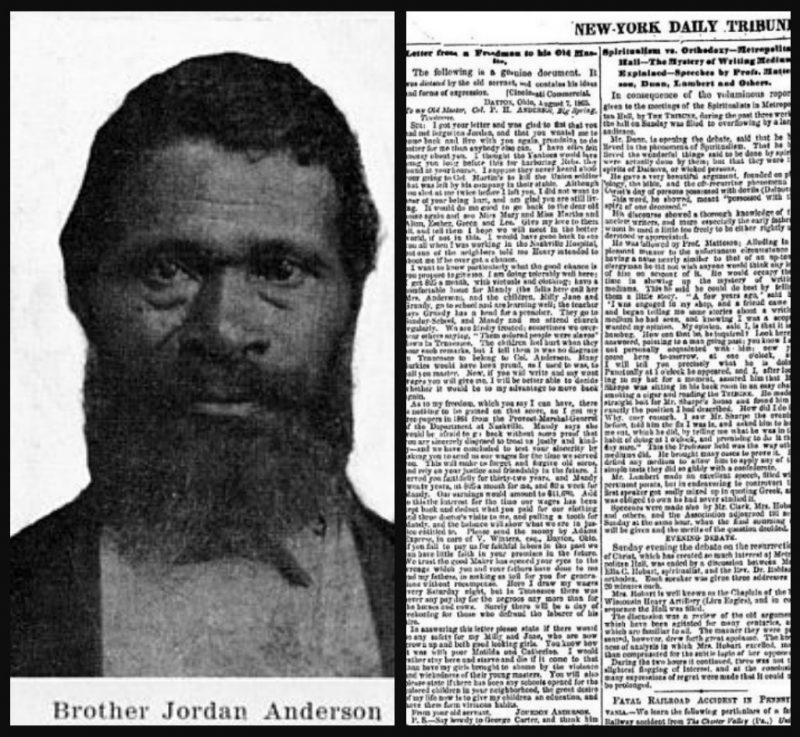Jordan Anderson was born around 1825 somewhere in Tennessee. When he was around 7-years-old he was sold as a slave to General Paulding Anderson.
He was a personal servant and also a playmate of general’s son Patrick Henry Anderson since they were both around the same age.
As years passed by he became one of the most reliable and able workers on the Anderson family plantation in Big Spring, Tennessee.
He married Amanda McGregor in 1848 and in 1864 and they would eventually have eleven children together, after 32 long years in the service of his master, Jordan Anderson and his wife, Amanda, escaped a life of slavery when Union Army soldiers freed them from the plantation.

When his freedom was granted he left the plantation immediately. His master Patrick Henry Anderson was so angry that Jordan was leaving the plantation that he tried to shoot him, but a neighbor managed to grab Patrick’s pistol from him. He vowed to kill Jordan if he ever set foot on his property again.
Jordan started working in a hospital where he became close friends with a surgeon called Dr. Clarke McDermont. In 1865 when the Civil War ended, Dr. Clarke McDermont helped Jordan and his family move to Dayton, Ohio where his father-in-law, Valentine Winters, was living and could help Jordan to secure work in the town.
Jordan was living a quiet life with his large family but in July of 1865, he received an urgent letter from his former master. Since he couldn’t read he took the letter to Valentine Winters and asked him to read it to him.
As it was written in the letter the Anderson’s plantation had fallen into complete disrepair and Anderson found that he could not keep up his holdings after losing his captive labor force so he decided to ask help from Jordan.
Apparently, Jordan’s former master was in total financial ruin. He promised that Jordan would be paid and be treated as a free man if he returned.

After few days Jordan decided to write back to his former master. You can read the full letter which appeared at Letters of Note below.
Dayton, Ohio,
August 7, 1865
To My Old Master, Colonel P.H. Anderson, Big Spring, Tennessee
Sir: I got your letter, and was glad to find that you had not forgotten Jourdon, and that you wanted me to come back and live with you again, promising to do better for me than anybody else can. I have often felt uneasy about you. I thought the Yankees would have hung you long before this, for harboring Rebs they found at your house. I suppose they never heard about your going to Colonel Martin’s to kill the Union soldier that was left by his company in their stable. Although you shot at me twice before I left you, I did not want to hear of your being hurt, and am glad you are still living. It would do me good to go back to the dear old home again, and see Miss Mary and Miss Martha and Allen, Esther, Green, and Lee. Give my love to them all, and tell them I hope we will meet in the better world, if not in this. I would have gone back to see you all when I was working in the Nashville Hospital, but one of the neighbors told me that Henry intended to shoot me if he ever got a chance.
I want to know particularly what the good chance is you propose to give me. I am doing tolerably well here. I get twenty-five dollars a month, with victuals and clothing; have a comfortable home for Mandy,—the folks call her Mrs. Anderson,—and the children—Milly, Jane, and Grundy—go to school and are learning well. The teacher says Grundy has a head for a preacher. They go to Sunday school, and Mandy and me attend church regularly.
We are kindly treated. Sometimes we overhear others saying, “Them colored people were slaves” down in Tennessee. The children feel hurt when they hear such remarks; but I tell them it was no disgrace in Tennessee to belong to Colonel Anderson. Many darkeys would have been proud, as I used to be, to call you master. Now if you will write and say what wages you will give me, I will be better able to decide whether it would be to my advantage to move back again.
As to my freedom, which you say I can have, there is nothing to be gained on that score, as I got my free papers in 1864 from the Provost-Marshal-General of the Department of Nashville. Mandy says she would be afraid to go back without some proof that you were disposed to treat us justly and kindly; and we have concluded to test your sincerity by asking you to send us our wages for the time we served you. This will make us forget and forgive old scores, and rely on your justice and friendship in the future.
I served you faithfully for thirty-two years, and Mandy twenty years. At twenty-five dollars a month for me, and two dollars a week for Mandy, our earnings would amount to eleven thousand six hundred and eighty dollars. Add to this the interest for the time our wages have been kept back, and deduct what you paid for our clothing, and three doctor’s visits to me, and pulling a tooth for Mandy, and the balance will show what we are in justice entitled to.
Please send the money by Adams’s Express, in care of V. Winters, Esq., Dayton, Ohio. If you fail to pay us for faithful labors in the past, we can have little faith in your promises in the future.
We trust the good Maker has opened your eyes to the wrongs which you and your fathers have done to me and my fathers, in making us toil for you for generations without recompense.
Here I draw my wages every Saturday night; but in Tennessee there was never any pay-day for the negroes any more than for the horses and cows. Surely there will be a day of reckoning for those who defraud the laborer of his hire.
In answering this letter, please state if there would be any safety for my Milly and Jane, who are now grown up, and both good-looking girls. You know how it was with poor Matilda and Catherine. I would rather stay here and starve—and die, if it come to that—than have my girls brought to shame by the violence and wickedness of their young masters.
You will also please state if there has been any schools opened for the colored children in your neighborhood. The great desire of my life now is to give my children an education, and have them form virtuous habits.
Say howdy to George Carter, and thank him for taking the pistol from you when you were shooting at me.
From your old servant,
Jourdon Anderson.
Jordan asked Winters to sent the letter to Patrick with the informal title “Letter from a Freedman to His Old Master.” The letter was later published in an edition of the Cincinnati Commercial with the same title. The letter was very popular because of the eloquence and the sarcasm used by Jordan in it. The letter became so popular that was published everywhere across the country and even made it to Europe.
